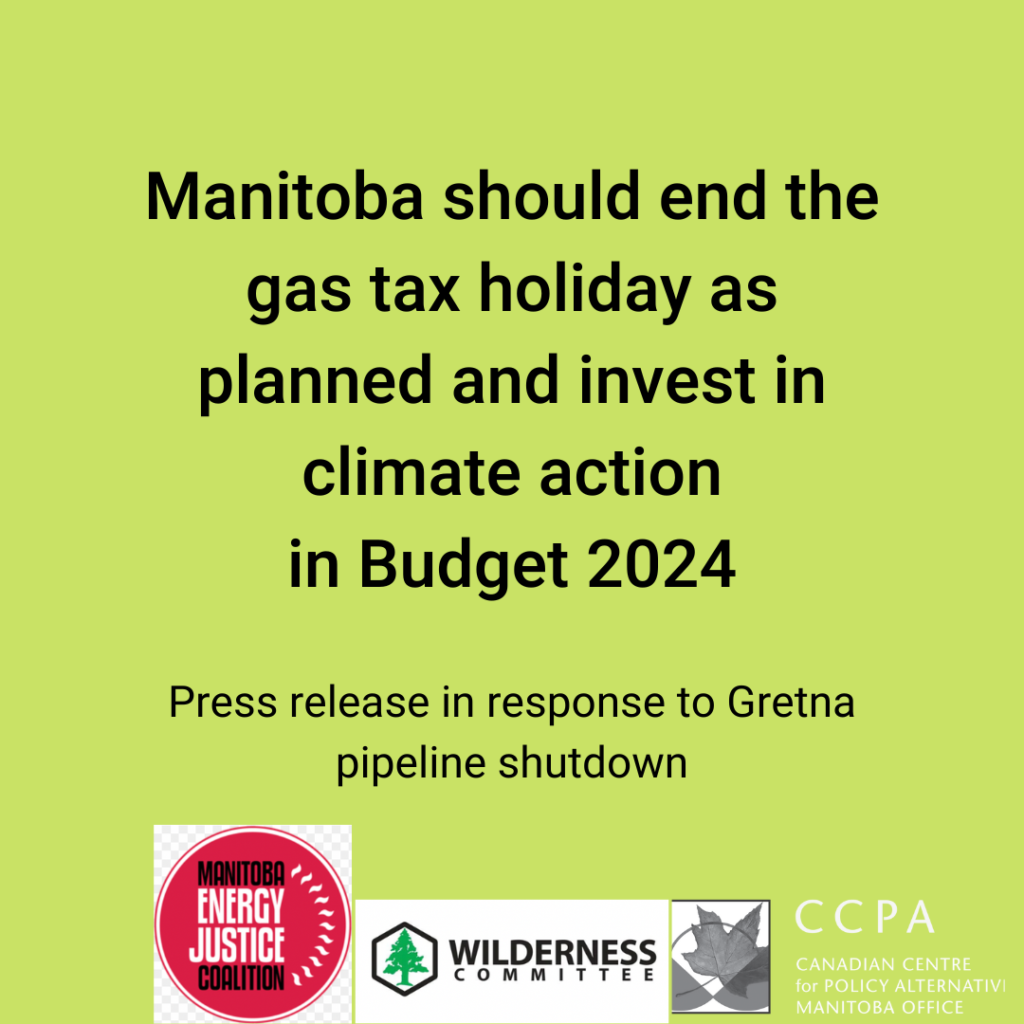Press release sent on behalf of the Canadian Centre for Policy Alternatives – Manitoba, Manitoba Energy Justice Coalition and the Wilderness Committee Manitoba

FOR IMMEDIATE RELEASE – March 21, 2024
WINNIPEG / TREATY 1 TERRITORY AND HOMELAND OF THE MÉTIS NATION —
The Manitoba government should end the gas tax “holiday” on June 30 as planned and restore the tax to 14 cents per liter at least, as gas tax revenue is needed to fund climate transition and reduce Manitoba’s reliance on fossil fuels. This should not change in the face of the shutdown of the main fossil fuel pipeline to Manitoba on March 17, 2024. Acting on affordability is important for Manitobans, but not at the expense of long term debilitating effects of the climate crisis.
The earth is in a climate crisis. Canada’s minister of emergency preparedness has warned that the 2024 Canadian wildfire season will top the devastation seen in 2023, the worst fire season on record. The Canadian Climate Institute estimates billions in economic losses relative to a stable climate scenario in 2025. In Manitoba this is being demonstrated, for example, by low water levels creating a deficit position for Manitoba Hydro.
The Manitoba government has committed to play a leading role in a future net-zero economy. The majority of Manitoba’s carbon pollution emissions are from the transportation sector (38% in 2021).
When he was elected, Premier Wab Kinew said cutting the gas tax was to be for six months only as a cost of living measure. In the September 22, 2023 televised leadership debate he said the provincial gas would be cut for a short period of time so as not to influence economic decisions on gas use in the long-term, and incentivize a climate-friendly future.
“Manitoba’s reliance on gas, diesel and jet fuel is a drain on the economy. One pipeline brings Manitoba fossil fuels and another pipeline sucks Manitoba’s money — billions of dollars per year — out of our pockets and out of our provincial economy.” says Andrea Pelletier of the Manitoba Energy Justice Coalition.
Gas prices are volatile and impacted by many factors outside of the control of the provincial government: production and refinery capacity, global demand and supply, and international events that disrupt supply fossil fuel chains such as wars. While eliminating the gas tax can provide short-term savings to Manitoba families, these savings quickly evaporate when fuel prices begin to climb. What it does do is reduce revenue to the provincial treasury, which is particularly needed after the previous provincial government cut $1.6 billion of annual revenue resulting in a massive unanticipated deficit in Manitoba at a time of crisis.
“The unscheduled maintenance by Imperial Oil on the Gretna pipeline and its impact on Manitoba shows how reliant Manitoba is on corporate-controlled fossil fuels. Manitoba should reinstate the gas tax at at least 14 cents per liter immediately to improve affordability of our transportation system, starting with a transfer asap to municipalities to bring down bus fares and fast-track the electrification of the transit and transportation system” says Molly McCracken, CCPA Manitoba director.
Over the long term, to save people money, reduce inflation, reduce emissions and strengthen the provincial economy, replacing fossil fuels with locally made low-carbon energy is clearly the route to take. Overall, the carbon tax has contributed 0.15% to inflation in Canada, while around 80% of Canadians receive a larger climate action incentive than they pay in carbon tax. New research from the Canadian Climate Institute shows that while households feel a smaller pinch from the carbon tax, it is proving effective in incentivizing corporations to invest in reducing emissions. Manitoba should work collaboratively with the federal government to set up a provincial carbon pricing program that channels funding to low carbon options for households while continuing to incentivize low carbon investment.
“Continuing the government’s subsidy for fossil fuels is the wrong approach given the climate crisis and the costs to the economy of climate change and climate emergencies,” says Eric Reder of the Wilderness Committee.
About:
The Canadian Centre for Policy Alternatives is Canada’s leading progressive research institute. The Manitoba office publishes on fiscal and climate policy.
MEJC is a community-led alliance of volunteers living in Manitoba committed to climate action and climate justice.
The Wilderness Committee is a people powered nature protection charity working for a wild future.


